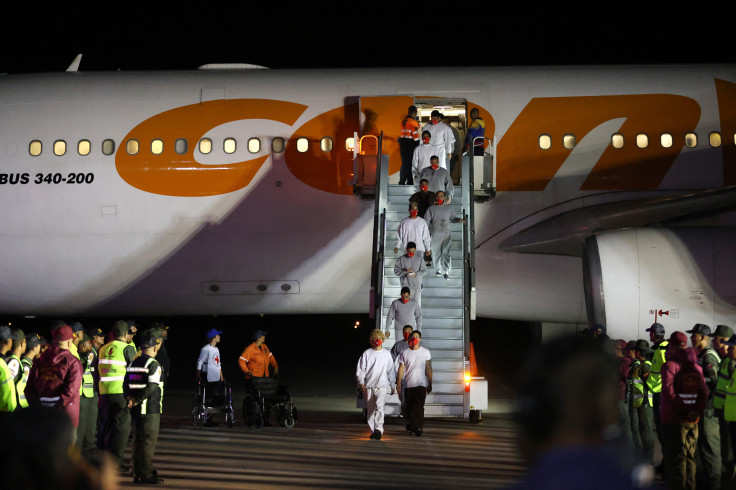
In just four months, the Trump administration has deported more Venezuelans than during the previous four years combined, according to a new report.
The surge comes as President Donald Trump intensifies immigration enforcement, including the removal of women and children—despite claims that deportations are targeting those with criminal records. According to Venezuelan nonprofit Votoscopio, which tracks repatriation flights, 273 women and 29 children are among the recent deportees.
In all, the Miami herald report reveals, at least 3,078 Venezuelans have been deported since January, compared to 3,256 deported over the entire 2019–2023 period under both the Trump and Biden administrations. Since the beginning of the year, 24 flights have carried Venezuelan nationals back, most of them operated by Conviasa, Venezuela's state airline, which had previously been under U.S. sanctions. Two flights originated from Guantánamo Bay, Cuba, including one carrying 35 individuals accused of being affiliated with gangs.
The sharp rise in deportations coincides with alleged behind-the-scenes negotiations between the Trump administration and the Maduro government which, also according to The Herald, are aimed at exchanging mass deportation acceptance by Venezuela for U.S. concessions, including a license extension for Chevron to export Venezuelan oil. Secretary of State Marco Rubio rejected the possibility on Thursday, saying the company's license will expire next week as scheduled.
A Caracas-based source told the news site that under proposed terms, Maduro would remain in power while granting broad oil and mining access to U.S. companies. In return, Maduro is seeking removal from U.S. sanctions lists and the dropping of drug trafficking charges against top officials. Legal experts have questioned whether the executive branch can intervene in such federal prosecutions.
Central to the negotiations is securing a commitment from Maduro to accept deportees, as the Herald explains:
"While Maduro has recently allowed an estimated 5,000 deportees to return from the U.S., Mexico, and Central America, a recent Supreme Court ruling that permits the Trump administration to rescind Temporary Protected Status for Venezuelans could result in the possible deportation of hundreds of thousands"
The reported deal, however, could face harsh opposition in Congress, and would likely face push back from U.S. Reps. Mario-Díaz-Balart, María Elvira Salazar and Carlos Giménez, the three Cuban American members of the House. Asked by Venezuelan journalist Carla Angola if the three would be successful in preventing the extension of Chevron's license, Salazar said:
"Of course we will, we are members of Congress. President Trump promised to reverse Biden policies and he is doing it. We can´t sell out democratic principles over four dollars"
© 2025 Latin Times. All rights reserved. Do not reproduce without permission.






